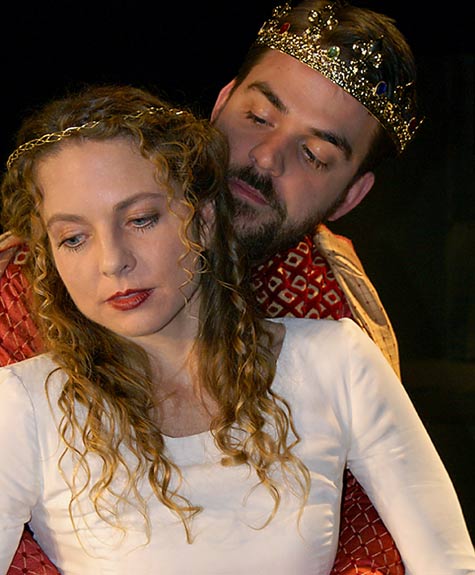
SENSITIVE INTELLIGENCE: The Originals' April production of Silence. |
First, a tribute to a few of the year's newer theater ventures, starting with Mad Horse's exciting and offbeat new Dark Nights Series: Performed in the Studio Theater at Portland Stage, the series brings an audience to lesser known and locally written scripts. So far, these have included works by Harold Pinter and local thespian Brent Askari. Another intrepid young company is Harbor Light Stage. This Kittery-based company boasts marvelous casting, and has an adventurous streak when it comes to site locations, having staged its last two plays in a 19th-century barn and the ceremonial room of York's Saint Aspinquid Masonic Lodge. Finally, a third recently assembled group, Fenix Productions, filled last summer's dearth of open-air theater with a giddy production of Two Gentlemen of Verona, as channeled through John Hughes.
Fenix was not alone in dishing up compelling new interpretations of the classics. Portland Stage's Julius Caesar, set in modern political America and presented during the height of election season, was superbly, frighteningly topical. Another masterful re-envisioning of Shakespeare, up at the Theater at Monmouth, set its Merchant of Venice in early 1960s Camelot America. And Mad Horse regaled us with the tragedy of Hedda Gabler as Americanized in the stifling Midwest of the 1950s. Each of these productions offered audiences a new lens on a classic, along with a fresh angle of social critique via history.
Other thespians engaged social history through original scripts. Venerable local theater artist Harlan Baker wrote and performed the one-man Jimmy Higgins: A Life in the Labor Movement. This work of historical fiction follows Jimmy through an array of political and personal milestones, chronicling the political moods of both a man and a culture. A different company also offered a close look at cultural perspectives, but from a non-fiction, ethnographic standpoint: The Open Waters Theatre Arts group first conducted state-wide oral history research, interviewing our friends and neighbors on the subject of the Maine Woods, Plum Creek, and Maine's waning mill culture. The company then dramatized a range of the Mainers' reflections, in a production of ethereal, earnest documentation and critique.
The last year also showcased the less earnest form of critique — satire — and audiences saw some zingers. Two different companies — Lyric Music Theater and Vacationland Co. — presented the wickedly dystopic musical Urinetown, while Generic Theater, down at the Players' Ring in Portsmouth, mounted Albee's dark The Goat (yes, the pun is intended). More recently at the Ring, The New York Theatre Company produced the scathing, scabrous Thanksgiving send-up of American liberalism The Pain and the Itch.
Of a similar but distinctively Irish darkness are the works of playwright Martin McDonagh — though I maintain that they do also hold a certain light. I was pleased to see his work on two stages this year: Mad Horse shocked and serenaded with the appalling yet beautiful The Pillowman, while the American Irish Repertory Ensemble staged the murderous domestic shenanigans of two fratricidal brothers in The Lonesome West.